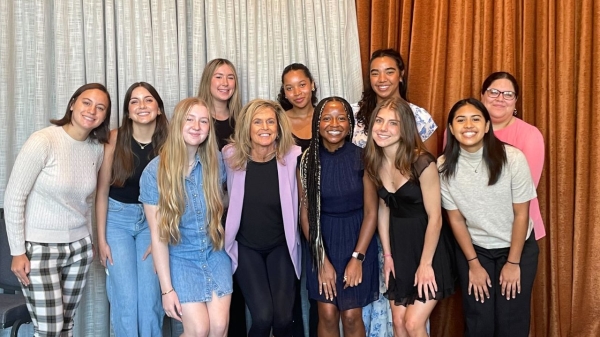ASU director joins roundtable to discuss need for moderation in politics, public life

Paul Carrese, director of Arizona State University's School of Civic and Economic Thought and Leadership, joined a roundtable discussion at the 49th Annual Northeastern Political Science Association Conference held Nov. 9–11 in Philadelphia to discuss Aurelian Craiutu’s book, "Faces of Moderation: The Art of Balance in an Age of Extremes."
The roundtable was an “Author Meets Critics” session that brought Carrese alongside Craiutu to discuss what it means to be a moderate voice in both politics and public life. Other participants included Murray Bessette, director of Academic Programs at the Victims of Communism Memorial Foundation; Bryan-Paul Frost, political science professor at the University of Louisiana Lafayette; and Dan Mahoney, political science professor at Assumption College.
In "Faces of Moderation," Craiutu examines the work of multiple prominent twentieth-century political thinkers, addressing both the strengths and limitations of moderation in the face of political binaries and extremes — especially fascism and communism. Craiutu applies these lessons to liberal democracies today, which face a new kind of extremism in our polarized and angry politics.
Craitu, Carrese and other participants addressed the inconsistencies between the extremism of campaign rhetoric with the moderation necessary to effectively legislate once elected, by brokering compromises across party lines. In fact, our constitutional system of separation of powers and federalism was designed to mitigate extremes and reward moderation by pushing parties and individual politicians to moderate their rhetoric and actions given the need to negotiate and conciliate in a complex political system.
The panelists discussed why our universities don’t emphasize these ideas, and how to balance a commitment to fundamental truths and values with the importance of avoiding polarization and extremism.
Carrese has published extensively on the importance of balance and restraint in a representative democracy, including his 2016 book, "Democracy in Moderation: Montesquieu, Tocqueville, and Sustainable Liberalism," which describes liberal democracy as fundamentally rooted in the avoidance of extremes. According to Carrese, moderation is a means for “coping with the complexity of the world” in a way that reconciles important principles and seeks a golden mean, without being reduced to polarization and ideological strong-arming.
Both Craiutu’s and Carrese’s books on the subject are available in print or as e-books.
"Democracy in Moderation" has received prominent reviews published by Real Clear Politics, The Claremont Institute, and The Public Discourse.
"Faces of Moderation" has been reviewed by David Brooks and Peter Wehner for the New York Times, and by the Wall Street Journal.
More Law, journalism and politics

Cronkite School launches Women Leaders in Sports Media live-learn program
Women in a new sports media program at Arizona State University got a solid game plan from a sports veteran at an Aug. 20 welcome…

ASU center to host the Pursuits of Education and Excellence Symposium
The Center for the Study of Race and Democracy (CSRD) at Arizona State University is introducing the Pursuits of Education and…
ASU journalism students dominate NATAS Student Production Award nominations
Students at Arizona State University’s Walter Cronkite School of Journalism and Mass Communication dominated the nominations…